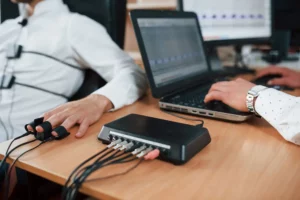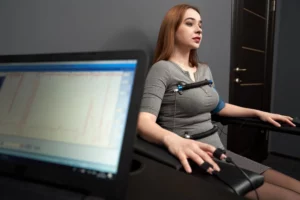Throughout the history of employment in the United States, employers have sought methods to verify the honesty and integrity of job applicants. One such method is the use of polygraph tests, which date back to the early 1900s. The first polygraph machine was invented by John Larson in 1921, and it was later improved by Leonard Keeler in 1930. At that time, polygraph tests were mainly used for criminal investigations and law enforcement purposes.

In the 1940s, the use of polygraph tests expanded to the private sector, particularly for screening job applicants in industries such as defense, security, and law enforcement. The rationale behind this was that people who had something to hide would be deterred from applying for such jobs, and those who did apply could be subjected to a polygraph test as a condition of employment.
In 1988, the Employee Polygraph Protection Act (EPPA) was passed in the United States, which severely restricted the use of polygraph tests by private employers. The EPPA prohibits most private employers from requiring or suggesting that employees or job applicants take a polygraph test for employment purposes. The only exceptions are employers in certain industries, such as pharmaceuticals, armored car services, and nuclear power plants, among others.
The EPPA also regulates the administration of polygraph tests, requiring employers to provide written notice to employees and job applicants that polygraph tests are not mandatory and that they have the right to refuse to take the test.
The purpose of this article is to provide you with an informative overview of polygraph testing for employment in the United States. We aim to give you a comprehensive understanding of the current practices and controversies surrounding polygraph testing in the workplace.
The importance of understanding polygraphs in the hiring process
Understanding polygraph tests and their limitations is essential for both job seekers and employers. For job seekers, it’s important to know what to expect if a polygraph test is part of the hiring process. This can help alleviate any anxiety or stress associated with the testing process. For employers, it’s important to understand the limitations of the test and how they can impact the hiring decision.
In most cases, the results of polygraph examinations shouldn’t be the only criteria used to assess a candidate’s suitability for a job. They are not foolproof and can produce inaccurate results. This is due in part to the fact that the test relies on physiological responses, which can be influenced by factors other than deception. Additionally, certain medical conditions or medications can impact the test results, further limiting its effectiveness.
Common industries and positions that use polygraph examinations

Today, polygraph examinations are commonly used in the field of law enforcement. Agencies such as the Federal Bureau of Investigation (FBI), the Central Intelligence Agency (CIA), and state and local police departments may require applicants to take a polygraph examination as part of their hiring process.
Another industry where polygraph examinations are frequently used is the government. Positions in government agencies that require security clearances, such as the Department of Defense or the Department of Homeland Security.
In addition, some private industries may use polygraph examinations as part of their hiring process. For example, positions in the financial sector or in private security, such as those in banks, credit unions, investment firms, or other positions that deal with large sums of money or sensitive financial information, may require applicants to take a polygraph examination.
These industries may use the examination as a way to screen out candidates who may be at risk for fraud or theft.
Examples of companies or agencies that use polygraph testing
There are many companies and agencies in the United States that use polygraph testing as part of their hiring process or ongoing employment requirements. Some examples of companies or agencies that use polygraph testing include:
- Armored Car Companies: Companies that provide armored car services, such as Brinks and Loomis, often use polygraph testing as part of their hiring process to ensure that their employees are trustworthy and reliable.
- Retail Companies: Retail companies, such as Walmart and Target, have been known to use polygraph testing in certain situations, such as when investigating internal theft or fraud.
- Financial Services Companies: Financial services companies, such as banks and investment firms, may use polygraph testing for positions that involve handling large sums of money or access to sensitive financial information.
- Technology Companies: Some technology companies, such as Google, have been known to use polygraph testing as part of their security clearance process for certain positions.
- Aerospace and Defence Companies: Aerospace and defence companies, such as Lockheed Martin and Raytheon, may use polygraph testing for positions that involve access to classified information or sensitive projects.
- Nuclear Regulatory Commission (NRC): The NRC uses polygraph testing as part of its background investigation process for most candidates seeking a position with the agency.
- Drug Enforcement Administration (DEA): The DEA uses polygraph testing as part of its hiring process for special agent candidates.
- Department of Defence (DOD): The DOD uses polygraph testing for certain positions that require access to classified information or involve national security concerns.
- Private Security Companies: Many private security companies, such as Pinkerton and Securitas, use polygraph testing as part of their hiring process to ensure that their employees are trustworthy and reliable.
It’s worth noting These are just a few examples of the many companies and agencies that use polygraph testing in the United States. Also, the use of polygraph testing in the private sector is not as common as in government agencies, and it is largely voluntary.
The use of polygraphs in national security clearance

National security agencies such as the Central Intelligence Agency (CIA), the National Security Agency (NSA), and the Department of Defense (DoD) use polygraphs to screen individuals who are applying for or already hold security clearances.
The polygraph test is used to determine an individual’s honesty, integrity, and trustworthiness. It is designed to detect any deceptive behavior, such as lying or withholding information, that may pose a security risk.
Positions requiring national security clearance that require polygraph testing can range from entry-level positions to high-ranking positions, depending on the level of clearance required. For example, individuals applying for Top Secret security clearance will almost always undergo a polygraph test.
Differences between employment-related polygraphs and those for national security clearance
One of the most significant differences is the level of scrutiny and investigation involved. For employment-related polygraphs, the focus is primarily on verifying information provided by the applicant, such as employment history and criminal record. In contrast, national security clearance polygraphs delve much deeper, examining a candidate’s personal and professional life in detail. This includes questions about their financial situation, foreign contacts, drug use, and other potentially sensitive areas.
Additionally, the agencies responsible for conducting the polygraph examinations are different. Employment-related polygraphs are typically conducted by private companies or government agencies, while national security clearance polygraphs are conducted by specialized government agencies such as the National Background Investigations Bureau (NBIB) or the Defense Counterintelligence and Security Agency (DCSA).
Another key difference is the legal framework governing the polygraph examination. While both types of polygraph exams are subject to federal regulations, national security clearance polygraphs are governed by a specific legal framework, which outlines specific procedures and standards for conducting polygraph examinations for national security purposes.
It is also worth noting that the consequences of failing a polygraph for a national security clearance can be much more severe than failing an employment-related polygraph. While failing an employment-related polygraph may result in a job offer being rescinded, failing a national security clearance polygraph can result in the denial or revocation of security clearance, which can have serious career implications for those working in certain industries or positions.
Polygraph examinations for employment: the procedure
When an employer decides to use a polygraph examination as part of their hiring process, they will typically first inform the candidate that they will be required to take a polygraph test. This is usually done during the application or interview process, but it can also be done after an offer of employment has been made.
The next step is to schedule the polygraph examination. This can be done either on-site at the employer’s location or at an external polygraph testing facility. The candidate will be given a specific time and date to arrive for the examination.
On the day of the examination, the candidate will typically meet with the polygraph examiner and go over the questions that will be asked during the examination. The examiner will explain the procedure and answer any questions the candidate may have. The candidate will then be asked to sign a consent form agreeing to take the examination.
During the examination, the candidate will be connected to the polygraph machine and will be asked a series of questions. The examiner will typically start with some basic questions to establish a baseline, such as the candidate’s name and address. The examiner will then move on to more specific questions related to the job requirements or any issues that have arisen during the application process.
The candidate’s physiological responses, including changes in breathing rate, blood pressure, and perspiration, will be recorded by the polygraph machine. The examiner will use this data to analyze the candidate’s responses and determine if there are any signs of deception.
After the examination, the polygraph examiner will review the data and make a determination about the candidate’s truthfulness. The employer will then be given a report indicating whether the candidate passed or failed the examination. In some cases, the employer may choose to make a conditional employment offer pending the results of the polygraph examination.
Polygraph test question subjects for employment

While the questions asked in these tests can vary depending on the industry, job type, and employer, there are some common questions that are often included.
One common question asked in employee screening tests is about criminal history. Employers may ask job candidates if they have ever been convicted of a crime and, if so, what the nature of the crime was. Employers are often interested in how recent the conviction was, the severity of the offense, and whether it is relevant to the job for which the candidate is applying.
Another common question asked in employee screening tests is about employment history. Employers may ask job candidates about their previous work experience, including job titles, responsibilities, and reasons for leaving previous positions. Employers are often interested in whether the candidate has relevant experience for the job and whether there are any red flags in their employment history, such as frequent job changes or gaps in employment.
Financial history is another area that employers may inquire about during employee screening tests. Employers may ask job candidates about their credit score, outstanding debts, bankruptcies, and other financial information. This is often done to assess the candidate’s financial responsibility and whether they may be susceptible to bribery or other forms of financial misconduct.
Finally, employers may ask questions related to the job itself. For example, if the job involves working with sensitive information or equipment, the employer may ask questions about the candidate’s experience with similar equipment or their understanding of data security protocols.
Pros and cons of polygraph exams in the employment hiring process
Pros:
- Polygraph exams can help employers identify candidates who are truthful and reliable and who are less likely to engage in unethical or illegal behavior. This is particularly important in jobs that require a high level of security, such as law enforcement or government positions.
- Polygraph exams can help employers deter individuals with a history of unethical or illegal behavior from applying for jobs. The mere presence of a polygraph exam as a screening tool can discourage some people from applying.
- Polygraph exams can provide employers with valuable information that may not be uncovered through other screening methods. This can help employers make better hiring decisions and reduce the risk of hiring employees who may pose a threat to the organization.
Cons:
- Polygraph exams are not 100% accurate, and false positives and false negatives can occur. This means that some truthful candidates may be incorrectly identified as deceptive, and some deceptive candidates may be incorrectly identified as truthful.
- Polygraph exams can be invasive and cause candidates to feel uncomfortable or violated. This can lead to a negative perception of the organization and affect the candidate’s willingness to accept a job offer.
- Polygraph exams can be expensive, and the cost may be prohibitive for some organizations. This can limit the use of polygraph exams as a screening tool, particularly for smaller organizations.
Public opinion polls and studies on the topic
Public opinion polls have consistently shown that many people believe in the accuracy of polygraph testing. In a Gallup poll conducted in 2015, 61% of Americans said they believed polygraph tests were “generally accurate” in determining whether someone is lying or telling the truth. However, it’s important to note that the public’s perception of polygraph testing may not be based on scientific evidence.
Studies have also been conducted to assess public opinion on the use of polygraph testing in employment. One study published in 2014 found that participants were generally supportive of using polygraph testing for certain jobs, such as those in law enforcement and national security, but were less supportive of using it in other industries.
Another study conducted in 2016 found that participants had a higher level of trust in polygraph testing when it was conducted by a certified examiner and when the results were presented in a clear and understandable manner.
Ethics of polygraph examinations in employment

When it comes to the ethics of polygraph examinations in employment environments, there are a number of factors to consider. On one hand, employers have a responsibility to ensure the safety and security of their workplace and their employees. Polygraph examinations can be seen as one tool to help achieve this goal by providing a way to identify individuals who may pose a risk.
However, there are also concerns about the potential for abuse of polygraph examinations. For example, there is a risk that an employer could use polygraph testing to unfairly discriminate against certain employees or job candidates. There are also concerns that polygraph testing could be used as a way to intimidate employees or infringe upon their privacy rights.
The use of polygraph examinations in employment is a contentious issue, with strong opinions on both sides. It is important for employers to carefully weigh the potential benefits and drawbacks of polygraph testing before implementing it in their workplace. They should also take steps to ensure that any testing is conducted fairly and transparently and that employees’ privacy rights are respected.
Alternatives to Polygraph Exams
Behavioral interviews
Behavioral interviews are based on the premise that past behavior is a good indicator of future behavior. The questions asked during a behavioral interview are designed to elicit detailed responses about how a candidate has handled specific work-related situations in the past. The interviewer may ask questions like:
- “Tell me about a time when you had to handle a difficult customer.” “How did you handle the situation?”
- “Describe a time when you had to make a tough decision. “What was your thought process, and how did you ultimately make the decision?”
- “Can you tell me about a time when you had to collaborate with a difficult co-worker?” “How did you handle the situation?”
By asking candidates to provide detailed responses about past situations, employers can gain insight into their decision-making processes, problem-solving skills, and communication style. This information can be useful in predicting how candidates will handle similar situations in the future.
One advantage of behavioural interviews is that they do not rely on a machine or instrument to assess the candidate’s honesty. Instead, they rely on the candidate’s ability to describe past behaviour in detail.
Another advantage of behavioural interviews is that they are relatively easy to conduct. They do not require any specialized equipment or training, and can be conducted by any trained interviewer.
Background checks
Background checks are an essential part of the hiring process for many employers. These checks are conducted to ensure that the applicant has been honest in their application and to verify that they have the required qualifications and experience for the position.
There are several types of background checks that employers can conduct, including criminal background checks, employment verification, education verification, and reference checks.
Criminal background checks are one of the most common types of background checks. These checks are used to verify whether an applicant has a criminal record. This information can be obtained from a variety of sources, including police records, court records, and public records. Employers are legally required to obtain the applicant’s permission before conducting a criminal background check.
Employment verification is another important type of background check. This check is used to confirm the applicant’s previous employment history, including job titles, dates of employment, and reasons for leaving. This information can be obtained from the applicant’s previous employers or from a third-party verification service.
Education verification is also commonly used by employers. This check is used to confirm that the applicant has the education and qualifications they claim to have. This information can be obtained from the educational institution or from a third-party verification service.
Finally, reference checks are used to confirm the applicant’s work performance, skills, and personal characteristics. These checks involve contacting the applicant’s previous employers or other professional contacts to gather information about the applicant.
Reference checks
Reference checks are a commonly used tool in the hiring process, and they involve contacting previous employers, colleagues, or other professional contacts provided by the job applicant to gather information about the individual’s work history, skills, and work ethic. This process can provide valuable insight into the applicant’s past performance and help the employer make an informed decision about whether to hire them.
There are several key benefits to conducting reference checks as part of the hiring process. Firstly, they can help to verify the accuracy of the applicant’s resume and work history. Secondly, they can provide insights into the applicant’s work style, strengths, and weaknesses. Thirdly, reference checks can provide valuable information about the candidate’s character, attitude, and overall suitability for the job.
There are several potential challenges associated with reference checks, however. For example, some employers may be hesitant to provide a reference for a former employee, either because they are concerned about legal liability or because they do not wish to be involved in the hiring process. Additionally, some job applicants may provide references who are biased in their favour or who are not able to provide an accurate assessment of their skills and work history.
Drug tests
Types of Drug Tests
There are several different types of drug tests, including urine tests, hair tests, and blood tests. Urine tests are the most common type of drug test, as they are non-invasive, relatively inexpensive, and can detect a wide range of drugs. Hair tests are less common, but can detect drug use over a longer period of time than urine tests. Blood tests are the most accurate type of drug test, but they are also the most invasive and expensive.
Uses of Drug Tests
Drug tests can be used for a variety of purposes, including pre-employment screening, workplace drug testing, and testing in criminal justice contexts.
Accuracy of Drug Tests
Drug tests are generally considered to be reliable, but there are some factors that can affect their accuracy. False positives can occur if a person has taken certain medications or consumed certain foods that can cause a positive result. False negatives can occur if a person has used a drug that is not included in the test or if they have used a drug recently but not enough of it has accumulated in their system to be detected by the test.
Legal Issues
While drug testing is generally legal, there are some legal issues to consider. In some cases, drug testing may be considered an invasion of privacy, particularly if it is conducted without a person’s consent. Employers and other organizations that conduct drug testing may also need to comply with certain legal requirements, such as providing advance notice of testing or following specific procedures for testing and handling test results.
Recent trends in detecting deception in the employment hiring process

The growing use of technology, such as artificial intelligence (AI) and biometric scanners, to screen job candidates is one current trend in the use of employee screening exams. For instance, some employers use AI algorithms to assess the authenticity and credibility of job seekers by examining their facial expressions, speech tones, and other nonverbal indicators during video interviews. One such technology is voice stress analysis (VSA), which uses algorithms to detect changes in voice pitch, tone, and frequency to identify potential deception. Another technology that has gained attention is the use of brainwave analysis or functional magnetic resonance imaging (fMRI). This method measures brain activity in response to stimuli and can provide insight into whether a person is telling the truth or lying. However, the use of fMRI is still in its infancy and is not yet widely accepted in the employment hiring process. Similar to this, some companies use biometric scanners to confirm a job candidate’s identification, such as fingerprint or retinal scanners.
Conclusion
In conclusion, the use of polygraph examinations in the hiring process has been an intriguing topic for decades. While they were once widely used, there has been a shift towards alternatives in recent times, such as behavioural interviewing, background checks, and reference checks.
Additionally, recent trends have shown a shift towards the use of new technology in detecting deception, such as eye-tracking technology and voice analysis. These methods are still being developed and tested, but they show promise in providing objective and accurate results in the hiring process.

